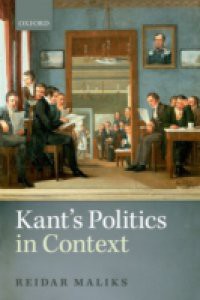Kants Politics in Context shows how Kant developed his legal and political philosophy in an environment of controversy between conservative and radical observers of the French Revolution. Reidar Maliks argues that Kant recognized in the Revolution of 1789 his own concept of equal freedom, which he in the following decade developed into a theory of law and the state. This concept of freedom was at the root of his condemnation of paternalistic government,which makes persons dependent on the good will of a ruler, and his denunciation of direct democracy, which subjects persons to the arbitrary decisions of a majority. It led Kant to develop a republican constitutionalism, where persons are free and independent because they are subject only to law. That Kant idealized the public sphere is well known, but that he intentionally developed his own philosophy in polemical articles and pamphlets aimed for a wide audience has not been fully appreciated. Paying attention to the debates he sparked during the 1790s- where radical followers like Fichte, Erhard, and Bergk clashed with conservative critics like Rehberg, Möser, and Gentz- can help us understand Kants political philosophy. The first comprehensive account of Kants politics incontext, this book provides a fresh perspective both on a foundational moment for modern political philosophy and on Kants central political concepts, including freedom, rights, citizenship, revolution, and war.

